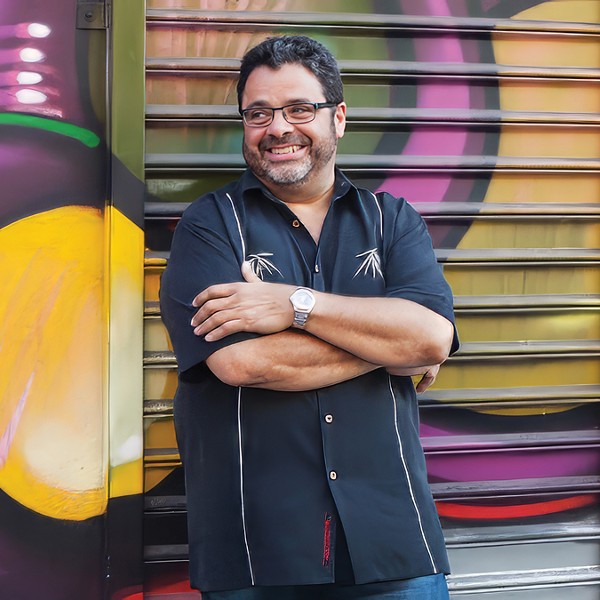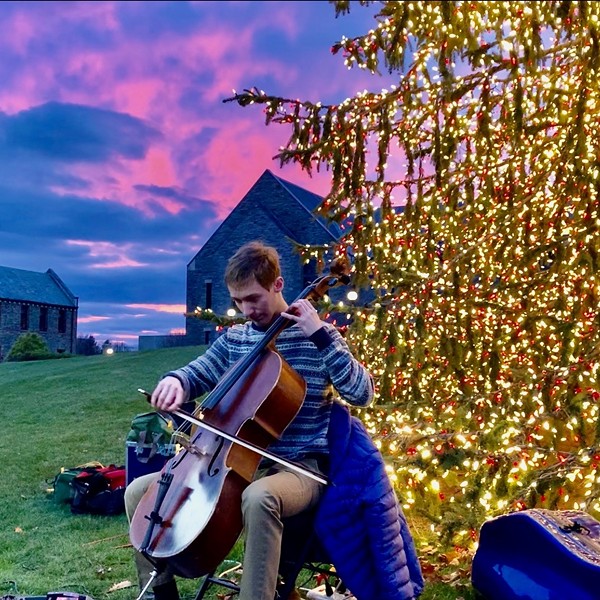In 1993 Saft moved to Brooklyn, falling in with a clutch of other young, open-eared improvisers raised on jazz, edgy rock, and more exotic sounds: drummers Jim Black and Ben Perowsky, guitarist Kurt Rosenwinkel, and saxophonist Chris Speed, all of whom he'd collaborate with in various settings. Expanding his instrumental arsenal, he increasingly began playing Hammond organ, Fender Rhodes, synths, accordion, and bass, and hooked up with Previte, touring with the drummer's Latin for Travelers outfit and as a soloist for the John Adams opera "I Was Looking at the Ceiling and Then I Saw the Sky." It was a circuitous twist of fate that came while Saft was shopping an album he made with future Pat Metheny trumpeter Cuong Vu that ultimately connected him straight to Zorn. "I'd given a copy of the record to my old teacher Joe Maneri, who was friends with [the late jazz critic and American Splendor star] Harvey Pekar," recalls Saft. "Joe and Harvey were talking about music and Harvey asked him if there were any newer players he should check out, and Joe told him about this session I'd done with Cuong. So one day I get this message on my answering machine saying, 'Hey, Jamie, this is Harvey Pekar. Joe Maneri says this record you made is really good. Can you FedEx me a copy?' So I did, and then a couple days later I get another message and it's from Zorn, saying, 'Hey, Harvey Pekar says this record you made is really good, can you FedEx me a copy?' So then I did that, and a couple of days later there's another message from Zorn: 'Hey man, the record's great. There's a check in the mail. The graphics person will be in touch about the artwork.'" Titled Ragged Jack, the set appeared in 1997 on Zorn's Avant Records label.
And so began Saft's long, ongoing association with New York's dean of downtown. In addition to his work on various labels and with Zorn's Electric Masada and Acoustic Masada bands and other projects, the keyboard maven has released dozens of albums as a leader on Zorn's Tzadik imprint that investigate, among other styles, Arabic and Jewish music and electronica (2000's Solvanut), the Bob Dylan songbook (2006's Trouble, with guest vocals by Mike Patton and Antony of Antony and the Johnsons), dub (2006's Merzdub, featuring Japanese noise artist Merzbow), heavy metal (2009's Black Shabbis), and traditional Jewish sounds (2011's Borscht Belt Studies); 2010's A Bag of Shells compiles Saft's work for Murderball and other indie film soundtracks.
Parents of three, Saft and his wife Vanessa, a singer-songwriter and visual artist, decided they'd outgrown their Brooklyn apartment and in 2007 found a place Upstate, attracted by the region's community as much as its vibrant music scene. "It's great to be able to connect to the Earth, and be somewhere where there's this great culture of sustainability and ethical living," he says, adding, "but of course we all gotta work to keep it that way." On his own Veal Records label, Saft has released titles by his and Vanessa's children's music duo, New Raspberry Bandits, and the reggae/jazz New Zion Trio, whose new album, Chaliwa, features vocalist H.R. of punk/reggae legends the Bad Brains on one cut. "Growing up in Queens, reggae was another kind of music that was always around. I was such a huge Bob Marley fan," says Saft. "And the Bad Brains were such a key band in the evolution of heavy music. I got to know H.R. better when [departed Beastie Boys member Adam Yauch] asked me to play organ on the Brains album he produced [Build a Nation; 2007, Oscilloscope/Megaforce Records]." Chaliwa is the New Zion Trio's second Veal release, and features new bassist Brad Jones stepping in for founding member Larry Grenadier.
Also new on the label is Nowness, a set by Saft and drummer Jerry Granelli, best known for his playing with the Vince Guaraldi Trio of "Peanuts" fame. "What makes Jamie so exciting to play with is his absolute fearlessness, coupled with his dedication to serving the music," says Granelli. "He provides constant challenge, in the best sense of that word. Jamie always comes to play, no holding back, beyond style. That is what all the great players bring, and Jamie is one of those."
The New Standard, a twinkling offering of sparse organ and piano jazz slated for release on RareNoise Records this spring, is rife with the reliably spacious and surprise-filled playing of Saft and his Hudson Valley neighbors Swallow and Previte. Also on the local horizon for the Kerhonkson keyboardist is Kingston Yard, a new reggae duo with New Zion Trio drummer Craig Santiago that focuses on dub exclusively (the project will perform with a varying cast of special guests on the first Thursday of each month starting April 3 at BSP Lounge in Kingston).
With an ever-burgeoning shelf of releases and a perpetually packed calendar of live dates for his myriad bands, what is it that drives Saft to keep up the pace while juggling family life—not to mention breathing and eating once in a while? "There's a Hebrew phrase, tikkun olam, which means 'repair the world,'" he says. "I get great personal satisfaction from creating music, but I also feel like I'm doing something that truly serves the world and helps repair it. To me, that's what all true artists do." And with such an outlook, there can only be more triumphant days ahead.
The New Zion Trio's Chaliwa and Jerry Granelli and Jamie Saft's Nowness are out now on Veal Records. Jamiesaft.com.
















